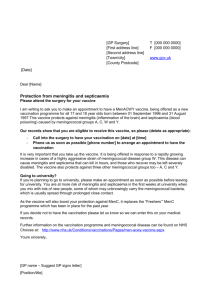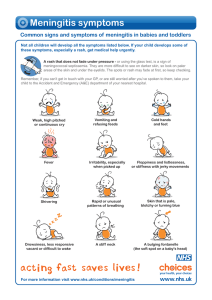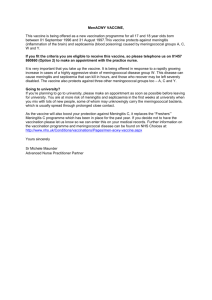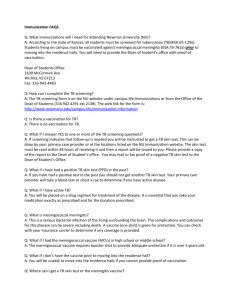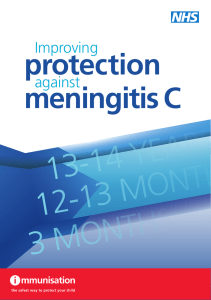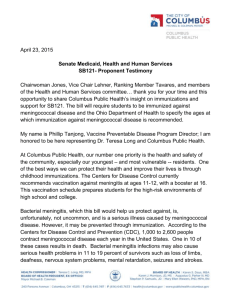Meningitis and septicaemia are very serious and require urgent
advertisement
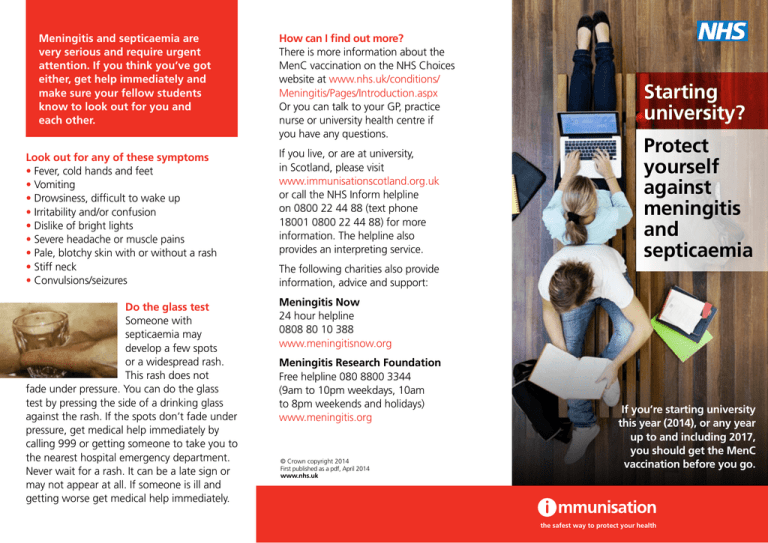
Meningitis and septicaemia are very serious and require urgent attention. If you think you’ve got either, get help immediately and make sure your fellow students know to look out for you and each other. How can I find out more? There is more information about the MenC vaccination on the NHS Choices website at www.nhs.uk/conditions/ Meningitis/Pages/Introduction.aspx Or you can talk to your GP, practice nurse or university health centre if you have any questions. Look out for any of these symptoms • Fever, cold hands and feet • Vomiting • Drowsiness, difficult to wake up • Irritability and/or confusion • Dislike of bright lights • Severe headache or muscle pains • Pale, blotchy skin with or without a rash • Stiff neck • Convulsions/seizures If you live, or are at university, in Scotland, please visit www.immunisationscotland.org.uk or call the NHS Inform helpline on 0800 22 44 88 (text phone 18001 0800 22 44 88) for more information. The helpline also provides an interpreting service. Do the glass test Someone with septicaemia may develop a few spots or a widespread rash. This rash does not fade under pressure. You can do the glass test by pressing the side of a drinking glass against the rash. If the spots don’t fade under pressure, get medical help immediately by calling 999 or getting someone to take you to the nearest hospital emergency department. Never wait for a rash. It can be a late sign or may not appear at all. If someone is ill and getting worse get medical help immediately. Meningitis Now 24 hour helpline 0808 80 10 388 www.meningitisnow.org Starting university? Protect yourself against meningitis and septicaemia The following charities also provide information, advice and support: Meningitis Research Foundation Free helpline 080 8800 3344 (9am to 10pm weekdays, 10am to 8pm weekends and holidays) www.meningitis.org © Crown copyright 2014 First published as a pdf, April 2014 www.nhs.uk If you’re starting university this year (2014), or any year up to and including 2017, you should get the MenC vaccination before you go. the safest way to protect your health Meningococcal group C disease is a rare but life threatening disease that occurs mainly in young children and young adults. This leaflet explains why it’s important that students starting university for the first time this year have a MenC vaccination before they go, to protect them against the disease. It’s likely you had a MenC vaccination as a young child, but immunity to the disease decreases over time. You are more at risk of getting meningitis just after starting university as you will be mixing closely with lots of new people some of whom may unknowingly carry the meningococcal bacteria. So you should get a MenC booster before you go. What is meningococcal group C disease? Meningococcal group C bacteria can cause meningitis (inflammation of the lining of the brain) and septicaemia (blood poisoning, often, but not always, leading to a rash of dark spots). Both diseases are very serious, especially if not diagnosed early – they can even be fatal. The symptoms of these diseases are similar to those of flu, so you need to be able to recognise the differences very quickly. A full description of the signs and symptoms of meningitis can be found at www.meningitisnow.org and www.meningitis.org How common is it? Before the introduction of the MenC vaccine in 1999, infection with meningococcal group C bacteria resulted in hundreds of cases of meningitis or septicaemia each year, causing over a hundred deaths. Since its introduction, cases of the disease are much rarer but for the few that still get it the effects of the disease for the individual and their family will be just as devastating. Why do I need to get the vaccine? If you were born after September 1995, you should have received a MenC vaccination as a small child. We now know that your immunity to the disease will have decreased and your risk of catching the disease is higher. So if you are in this age group or have never had a MenC vaccination, you should make sure you’re protected before you start university. Older students who had the vaccine at school are still protected and should not need the booster. What do I need to do? It’s easy to get vaccinated. Just call your GP surgery and arrange an appointment – tell them you’re expecting to start university for the first time in the autumn and you need the MenC vaccination. You ideally need to have the vaccine at least two weeks before you start university, so make sure you give yourself plenty of time. What if I forget to get the vaccine before I go? You can still go to a GP at university and arrange to get the vaccine there. But try and do that straight away – ideally in freshers’ week – don’t leave it till later. Will everyone need a vaccination now? No, anyone born before September 1995, who received the MenC vaccination at school, won’t need another one. If you’re 25 or under and can’t remember, check with your doctor before leaving for university or if you’ve already arrived at university, check with the health centre. If in doubt, there is no harm in having an extra dose. Does it hurt? Are there any side effects? Any soreness you may get in your arm after the injection should quickly disappear. People rarely experience other side effects from the MenC vaccine but if you start to feel unwell, contact your GP.
